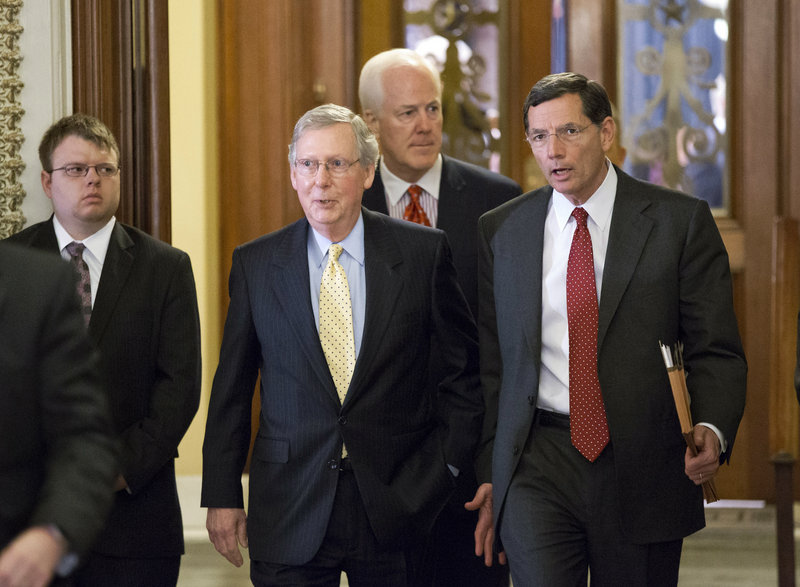WASHINGTON – After more than three hours of meetings Monday night, Republicans and Democrats wrapped up extraordinary closed-door talks over the fate of several of President Barack Obama’s stalled nominations without a resolution.
Instead, senators emerging from the meeting say the Republican and Democratic leadership will continue the discussions into the evening.
The Senate is scheduled to begin taking a series of votes in the morning on seven appointees whom Republicans have so far blocked. Majority Leader Harry Reid is giving no indication he planned to change that. Lawmakers from both parties reported progress in the meetings.
Nearly all 100 senators attended what amounted to an off-the-record session of the Senate down the hall from where lawmakers customarily debate the issues of the day with the public and news media in attendance.
Emerging at one point, Sen. Pat Roberts said the talks were continuing and had been productive. “I think the mood there is ‘How can we get out of this?”‘ said the Kansas Republican. He offered no details.
A Democrat, Montana’s Sen. Jon Tester, said a short while later that the two sides were not very far off in their search for a way out of a dispute that has long festered. No details were available of the session, which occurred in a room where 19th century senators hotly debated the future of slavery and other long-ago issues.
Majority Leader Harry Reid insisted in advance that Republicans permit yes-or-no confirmation votes on all seven of the nominees at issue. If they won’t, he declared, Democrats will change the Senate’s rules to strip them of their ability to delay.
There was no formal response from Republicans, although Reid and Senate Republican leader Mitch McConnell met privately during the day. Officials said several possible compromises had been floated in various meetings and conversations.
“Maybe there’s a little bit of a thaw,” said Sen. John Thune, R-S.D., as he entered the meeting. “The leaders are continuing to talk, the White house is involved in discussions with some of our members. Nothing has resulted from that, but the fact that people are still talking is a positive.”
At the core of the dispute is the minority party’s power to stall or block a yes-or-no vote on nearly anything, from legislation to judicial appointments to relatively routine nominations for administration positions. While a majority vote is required to confirm presidential appointees, it takes 60 votes to end delaying tactics and proceed to a yes-or-no vote.
The Democrats are threatening to change the rules only as they apply to nominations for administration positions, not judges or legislation.
Copy the Story Link
Send questions/comments to the editors.



Success. Please wait for the page to reload. If the page does not reload within 5 seconds, please refresh the page.
Enter your email and password to access comments.
Hi, to comment on stories you must . This profile is in addition to your subscription and website login.
Already have a commenting profile? .
Invalid username/password.
Please check your email to confirm and complete your registration.
Only subscribers are eligible to post comments. Please subscribe or login first for digital access. Here’s why.
Use the form below to reset your password. When you've submitted your account email, we will send an email with a reset code.